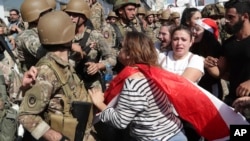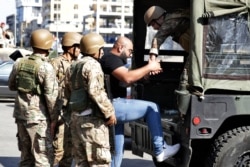From taxi drivers to frustrated parents hoping to get their children to school, people in Lebanon have found that protesters' roadblocks have changed their daily lives since the start of the uprising three weeks ago to oust the political elite blamed for corruption and poor public services. Lebanese troops deployed Tuesday throughout the country to reopen roads and main thoroughfares closed by anti-government protesters.
Even at the best of times, Beirut’s traffic-clogged streets can send tempers flaring. But add another element to the mix, such as roadblocks protesters are using to pressure authorities to meet their demands, and you have daily life turned upside down, says Helena Keenan, a Beirut resident and mother of three.
"The roadblocks have been one of the main barriers to getting the schools reopened. The pattern has been that at about 5 p.m. or 6 p.m., the schools will announce that school is open the next day," said Keenan. "And then there will be a barrage of various Twitter and Facebook postings: ‘We need to get to the streets. We need to close roads. We need to protest.’ Roads tend to close in the evening and that tends to get the moms all worked up and then by late morning, the army has them open again."
Keenan’s children and others have lost 12 days of school so far, leaving parents frustrated and concerned about loss of their children’s education. They returned Tuesday because the army insisted on opening the roadways. In Beirut's northern suburb of Zouk Mosbeh, a scuffle broke out when some demonstrators refused to remove their roadblock. The army then forcefully took them from the main highway linking Beirut with northern Lebanon. In other places, military men dressed in fatigues cajoled protesters, who moved away peacefully.
One taxi driver, George, calls the protests a “nice way to pressure the government for change,” even with the roadblocks. Another, Mohamed, however, complained that a 15-year-old protester tried to threaten him with a knife when he was stopped at a roadblock. Mohamed says ordinary people are fed up with the rampant corruption, but he fears the pressure now on Lebanon’s sectarian governance could erupt again into a civil war.
Still, Keenan says the mothers on her school’s What’s App group are trying to keep a sense of humor. One mother posted her own child’s protest, mimicking the real-life human chain that went the entire length of Lebanon as a civics lesson.
"Every school has these casual What’sApp groups that started as homework groups but has kind of become protest, revolution update groups. If a roadblock pops up somewhere, someone will inform," said Keenan. "Following the human chain that was made from Tripoli down to Tyre, one girl had lined up all of her stuffed animals from her bedroom, going down the hallway, and into the living room."
The protesters have demanded an end to traditional sectarian politics and for independent members to form a new government. It is still not clear what shape that will take after Prime Minister Saad Hariri announced his Cabinet's resignation late last month.














